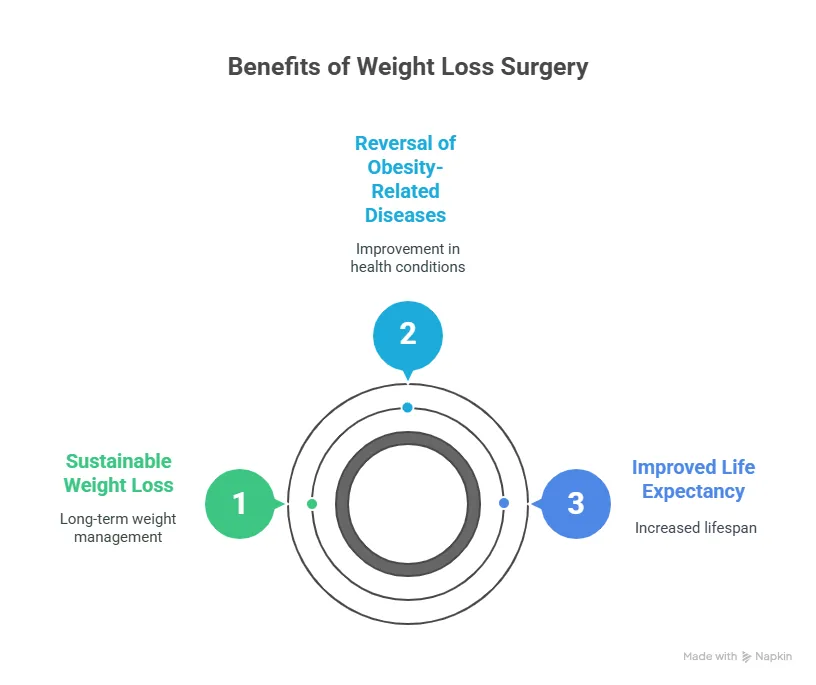
Obesity is a growing global health issue, and India is no exception. With rising lifestyle diseases, poor dietary habits, and sedentary lifestyles, the demand for sustainable weight loss solutions has significantly increased. Among various approaches, bariatric surgery—commonly known as weight loss surgery—has emerged as a transformative option for those who struggle with severe obesity and related comorbidities.
If you’re wondering, is weight loss surgery effective in 2025, this comprehensive guide will walk you through the science, types, outcomes, and long-term impact of bariatric surgery. It will also help you understand whether it’s the right solution for you or a loved one.
What is Weight Loss Surgery?
Weight loss surgery, or bariatric surgery, refers to a group of surgical procedures that help patients lose weight by modifying the digestive system. It is typically recommended for individuals who:
- Have a BMI (Body Mass Index) of 35 or more
- Have a BMI of 30+ with comorbidities like Type 2 diabetes, sleep apnea, or hypertension
- Have failed to lose weight through diet, exercise, or medications
There are various types of bariatric surgery, including:
- Gastric Sleeve (Sleeve Gastrectomy): Removes a portion of the stomach, reducing appetite.
- Gastric Bypass (Roux-en-Y): Reroutes the digestive system, reducing absorption of nutrients and food intake.
- Mini Gastric Bypass: A simpler and shorter version of the traditional bypass.
- Gastric Banding: A band is placed around the stomach to reduce food intake (less commonly used now).
How effective is Weight Loss Surgery in 2025?

Is weight loss surgery effective? The short answer is yes—especially with today’s medical advancements and tailored patient care plans. As of 2025, the effectiveness of bariatric surgery continues to be supported by clinical research, patient success stories, and the improved health outcomes that accompany substantial weight loss.
1. Sustainable Weight Loss
On average, patients lose 50% to 80% of their excess body weight within 12–18 months after surgery. With proper diet and lifestyle adherence, this weight loss is sustainable over the long term. This makes it far more effective than most non-surgical methods.
2. Reversal of Obesity-Related Diseases
Many patients experience remission or significant improvement in:
- Type 2 diabetes
- Hypertension
- Sleep apnea
- Joint pain
- Polycystic Ovary Syndrome (PCOS)
Some studies show up to 80% of patients with Type 2 diabetes go into remission post-surgery.
3. Improved Life Expectancy
Bariatric surgery not only reduces health risks but also enhances life expectancy. Recent research indicates that people who undergo the procedure may live up to 10 years longer compared to those who remain morbidly obese.
Is Weight Loss Surgery safe?
Safety is a valid concern for any surgical procedure. However, in 2025, bariatric surgeries are safer than ever, thanks to advancements in laparoscopic and robotic techniques, enhanced preoperative screening, and better postoperative care.
- Minimally invasive: Most bariatric procedures are performed laparoscopically, leading to reduced pain, minimal scarring, and quicker recovery.
- Low complication rates: Complication rates are under 5% when performed by experienced professionals.
- High success rates: With proper follow-up care and support, over 85% of patients achieve their weight loss goals safely.
Choosing the Best Bariatric Surgeon in Delhi can further reduce risk and enhance your outcomes.
Mental and Emotional Impact
Beyond physical transformation, the emotional and psychological benefits of bariatric surgery are profound. Patients report:
- Improved self-confidence
- Reduction in depression and anxiety
- Enhanced social life and personal relationships
- Increased motivation for career and life goals
However, mental preparation is essential. Psychologists and counselors often form part of the bariatric care team to help you adjust emotionally before and after surgery.
Lifestyle Changes Post-Surgery
Weight loss surgery is not a magic fix. While is weight loss surgery effective in initiating weight loss, maintaining it requires permanent changes in behavior and lifestyle.
Postoperative Guidelines Typically Include:
- Eating small, protein-rich meals
- Avoiding sugary and high-fat foods
- Taking vitamin and mineral supplements
- Regular exercise (at least 30 minutes/day)
- Attending follow-up appointments and support groups
The role of discipline and lifestyle commitment cannot be overstated.
Is Weight Loss Surgery Effective for Everyone?
Not everyone qualifies or benefits equally from bariatric surgery. Some factors that influence success include:
- Commitment to long-term lifestyle changes
- Regular follow-up and compliance with medical advice
- Mental and emotional readiness
- Support from family and professionals
That said, for most eligible individuals, weight loss surgery is effective and life-changing when done for the right reasons and followed by proper care.
Start Your Weight Loss Journey- With Dr. Pawanindra Lal!
Book An AppointmentFinal Thoughts
So, is weight loss surgery effective? Absolutely—especially in 2025, with modern surgical techniques, holistic patient care, and long-term follow-up. Bariatric surgery not only helps you lose weight but transforms your entire life—physically, mentally, and emotionally.
If you or a loved one are considering this option, consult the Best Bariatric Surgeon in Delhi to evaluate your eligibility and build a personalized treatment plan.
Weight loss surgery is not a shortcut—it’s a tool. And when used wisely, it becomes a powerful path to reclaiming your health and happiness.
Frequently Asked Questions
1. Is weight loss surgery effective in the long run?
Yes, when combined with lifestyle changes, weight loss surgery provides sustainable results, especially for those suffering from obesity-related health issues.
2. How much weight will I lose after bariatric surgery?
Most patients lose 50–80% of their excess weight within 12–18 months, though individual results may vary based on the procedure and adherence to follow-up care.
3. Is bariatric surgery covered by insurance in India?
Yes, many health insurance providers now cover bariatric surgery if it is deemed medically necessary. It’s advisable to check your policy for specific inclusions.
4. Who is the Best Bariatric Surgeon in Delhi?
There are several qualified surgeons in Delhi, but look for board certification, years of experience, and a comprehensive care program. Choosing the Best Bariatric Surgeon in Delhi ensures safety and optimal results.
5. Will I need to take vitamins after surgery?
Yes, vitamin and mineral supplementation is essential post-surgery, especially after gastric bypass and sleeve gastrectomy, to prevent nutritional deficiencies.
6. Can the weight come back after surgery?
It is possible if post-surgery guidelines are not followed. However, with proper care and regular follow-ups, most patients maintain significant weight loss.
